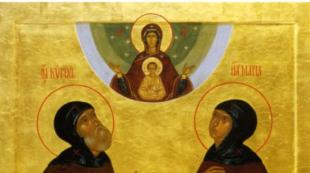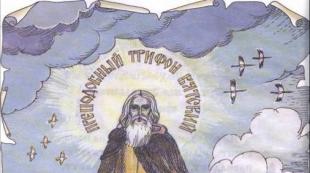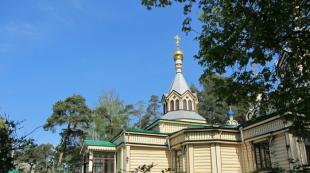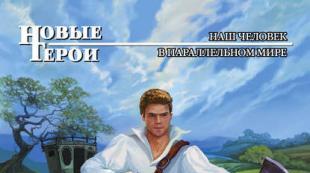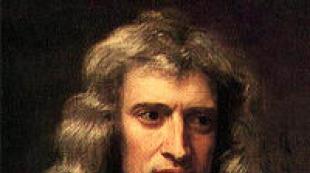Ilyin is a literature teacher and his methods. Psychological view (PsyVision) - quizzes, educational materials, catalog of psychologists. Lesson is help
Ilyin Evgeniy Nikolaevich. The new things that he introduced into didactics will be seen better and more clearly if his method is compared with the usual method of studying literature at school.
The system for presenting new material on literature had a traditional scheme: 1) the biography of the writer, poet is presented; 2) his work is studied and analyzed in large sections, for example, lyrics, civic poetry, fairy tales, historical stories by A.S. Pushkin or other writers, poets; 3) general ideas are illustrated with excerpts from the writer’s works, quotes from the poet’s poems; 4) conclusions are drawn about the artistic features of the works, about the writer’s contribution to the history of literature. There are, of course, options. With this system, the teacher “gives” (broadcasts) the material, and the student “takes” it, if there is a desire to “take”. Very often the student has no interest in reading the work. Not all students read program literature. At E.N. Everyone reads Ilyin! The negative side of the traditional study of literature: the cognitive task comes first, and only then the educational one. In the methodological system of E.N. Ilyin has a number of findings in the construction of the study of the topic, presented “in reverse”, in contrast to the traditional one. An innovative teacher sees the main goal of teaching literature in its educational function, and only then in its cognitive function. “It is possible to fully intensify knowledge in a public school only on an educational basis.” Having abandoned passive teaching methods (“Memorize as the textbook says!”), he uses a variety of techniques to encourage students to actively search for “their truth,” their own views and assessments of the problems being discussed. Techniques designed for the emotional impact of literary and poetic works on the student are constantly used. “To what extent the work of the mind becomes the work of the soul - this is the criterion of a literature lesson.”
E. N. Ilyin considers the detail to be the pearl of the text. “Unraveling everything with one knot and putting it all back together into a knot - isn’t it tempting? Problematicism, integrity, imagery - everything, everything is in this knot." "Starting with "trifles" and "details", the teacher argues, searches, argues, makes mistakes, corrects and reaches large generalizations: from detail -> through search -> to generalizations.The search begun in the lesson continues outside of it, creative and sometimes playful tasks appear.
Particular attention is paid to remarks and questions from students during the lesson. They express search, dispute, doubt, objection, desire to have your own point of view. Curiosity develops, the student is drawn to literature. And the teacher not only teaches, but also learns from the students.
E. N. Ilyin attaches importance to pedagogical technology. He considers the artistry of a teacher to be the highest teaching tool. A literature lesson is an art, and the teacher is the artist of his lesson: he is a screenwriter, a director, a performer, a discerning critic, and a literary critic. If this is not the case, says E.N. Ilyin, then the teacher deals with the notorious “gallery of images”, “figures, characters, where a literary academician unexpectedly ends up as one of the “typical representatives” of inanimate, invisible literature.”
The importance of communication between teachers and students in educational work is great, says E. N. Ilyin. It is necessary to build a new type of relationship between teacher and student, which is based on “goodwill, wise simplicity, mutual contact and interest.”
We talked about the experience of an innovative literature teacher. But what about E.N. Will a teacher of other subjects take Ilyin? Anticipating such a question, in one of his books he himself answered that his experience should be of interest not only to literary scholars and not only to teachers, because it has been verified by many years of practice and a high, stable final result. Of course, a teacher of any subject will take the educational function of the lesson, which ensures the success of the teacher’s work, the technique as the unit of the lesson, the active search work of students together with the teacher as co-creation, communication between the teacher and students as spiritual contact, pedagogical technique as an attribute of pedagogical skill.
Pedagogy © 2009 All Rights Reserved
Slovesnik Ilyin
Innovative teacher, literature teacher from St. Petersburg, author of the original concept of teaching fine literature.
According to Ilyin, literature is not just an academic subject, but “comprehension of life,” and the analysis of a work is accompanied by “work of the soul.” The list of program works contains a list of the most important moral problems, without solving which it is impossible to educate a Man. A lesson-problem is characterized by the posing of a relevant, topical, personally significant question, to which the student and teacher jointly seek an answer.
Discussion of what you read results in the development of a life position, and a personal attitude towards the heroes of the works clarifies ideological moral and ethical principles. Active participation in the debate of all students in the class is ensured by the teacher’s implementation of the “law of the three O’s: enchant with a book, inspire with a hero, enchant with a writer.”
One key detail becomes the point of “unfolding” of the entire work, and the answer to a question addressed to a given specific class and even a specific individual requires a thorough knowledge of the work, critical materials, and the writer’s biography.
Lessons from E.N. Ilyin is an “artistic analysis of a work of art.” He considers artistry, expression, and emotional impact to be among the important pedagogical techniques.
Ilyin Evgeniy Nikolaevich(b. November 8, 1929) - literature teacher at the 307th, then 516th secondary school in Leningrad (St. Petersburg). In the 1960-70s, he developed an original concept of teaching literature based on pedagogical communication. Ilyin’s system has become one of the components of cooperation pedagogy.
About him
His whole life is a struggle for attention. Not for discipline, not for silence in class - for attention. But isn’t there a struggle today throughout school, in art, and throughout the world for people’s attention—for people? Ilyin speaks only about his class, but gets into the very nerve of our time.
Ilyin answers this question, amazing in its accuracy and simplicity - how to win the attention of students - with the same unexpected simplicity. He says that a literature lesson must be constructed using exactly the same means as a work of art is constructed. The guys are attentive and active, “when they are spoken to in the language of unexpected techniques, sharp details, burning questions... - in a word, the language of art.” Reception, detail and question - all of Ilyin is in these three words.
Essays
- The lesson continues. - M., 1973.
- The art of communication. - M., 1982.
- Novel by M. A. Sholokhov “Virgin Soil Upturned” (From work experience). Book for the teacher. - M., 1985.
- Steps forward. - M., 1986.
- The birth of a lesson. - M., 1986.
- The path to the student. - M., 1988.
- The hero of our lesson. - M., 1991.
- “Results of the past days...” - L., 1991.
- From a vocabulary notebook. - St. Petersburg, 1993.
- Let's get together. - M., 1994 (co-author).
- How to get carried away by a book. - St. Petersburg, 1995.
- Let's educate the reader. - St. Petersburg, 1995.
Literature
- Soloveychik S. L. “Speaker Ilyin.” “Komsomolskaya Pravda”, 04/14/1977.
- Ostankino evenings. - M., 1988.
- Ivanikhin V.V. Why does everyone read Ilyin’s books? - M., 1990.
The author's system of the Leningrad (St. Petersburg) literature teacher Evgeniy Nikolaevich Ilyin was developed in the 1960s-1970s, but became widely known in the USSR in the mid-1980s - early 1990s. (it was at this time that the book was published V.V. Ivanikhin“Why does everyone read Ilyin’s books?” (1990), and most of the pedagogical works of E.N. himself were published. Ilyin: “The Birth of a Lesson” (1986), “The Path to the Student” (1988), “From a Literary Notebook” (1993), “How to Captivate a Book” (1995), etc.
1. Idea "educational education". The role of literature as an educational subject is, first of all, to organize children’s understanding of the moral problems that they face or will face in life. Therefore, in training “according to Ilyin,” the moral education of the individual comes to the fore, during which the necessary training is carried out.
 2. Idea teaching literature as art(and not as a scientific discipline). According to E.N. Ilyin, literature is a form of art studied at school, in which it is possible to combine all scientific knowledge in the humanities, give it integrity and enhance its influence on the student’s personality through a personal-emotional attitude. What matters is the emotional impact a work of art has on students. This does not mean neglecting the didactic principle of science, since Ilyin maintains factual accuracy, historical authenticity, and students’ mastery of literary concepts. But the main thing is not an abstract understanding and memorization of facts, but experiencing the problems described in the work, putting oneself in the place of a literary hero in situations of moral choice, and compassion for him. This allows students to deeply comprehend the content of a work of fiction in close connection with modern problems.
2. Idea teaching literature as art(and not as a scientific discipline). According to E.N. Ilyin, literature is a form of art studied at school, in which it is possible to combine all scientific knowledge in the humanities, give it integrity and enhance its influence on the student’s personality through a personal-emotional attitude. What matters is the emotional impact a work of art has on students. This does not mean neglecting the didactic principle of science, since Ilyin maintains factual accuracy, historical authenticity, and students’ mastery of literary concepts. But the main thing is not an abstract understanding and memorization of facts, but experiencing the problems described in the work, putting oneself in the place of a literary hero in situations of moral choice, and compassion for him. This allows students to deeply comprehend the content of a work of fiction in close connection with modern problems.
 Implementing these ideas, E.N. Ilyin structured the content of the school literature course in a special way. In each work of art, he identified moral questions and problems that are posed in one way or another. The lesson, therefore, is devoted not to a formal topic taken from a standard program, but to a problem that can arouse the interest of students. The point of the lesson is to find an answer to the question, comprehend the problem, and discuss possible ways to solve it.
Implementing these ideas, E.N. Ilyin structured the content of the school literature course in a special way. In each work of art, he identified moral questions and problems that are posed in one way or another. The lesson, therefore, is devoted not to a formal topic taken from a standard program, but to a problem that can arouse the interest of students. The point of the lesson is to find an answer to the question, comprehend the problem, and discuss possible ways to solve it.
The learning process with E.N. Ilyin is based on the formula “from personal experience to the analysis of a work of art and from it to the Book.” Students are introduced to the structure of the material being studied through the chain “detail – question – problem”.
1. "Detail". The study of a literary work begins with a vivid detail that stimulates the student’s interest in the book. This could be a small fragment from a work, a fact from the author’s biography, or something else. The main goal of using a detail is to make children want to talk about it and learn more.
 2. "Question." A way to introduce students to a problem. Basic requirements for the question:
2. "Question." A way to introduce students to a problem. Basic requirements for the question:
The topicality of the issue, personal significance for students;
If possible, address the question specifically to students in a given class and even to a specific student;
Resolving the problem contained in the question should require a thorough study of the work, textbook and additional literature, familiarization with the biography of the author, with the history of the creation of the work being studied.
3. "Problem." Searching for an answer to the question posed in a dialogue mode, organized and initiated by the teacher (collective discussion of the problem, discussion). The participants in the dialogue are three main subjects: the teacher, the student and the author of the work of art (thanks to constant references to the text). Moreover, students who comprehend and emotionally experience the book create a new personal context, becoming to some extent co-authors.
It should be noted that the proposed E.N. Ilyin’s method of creating problem situations “detail – question – problem” is universal; it can be easily used in teaching other subjects.
Notes
Valery Vasilievich Ivanikhin – Candidate of Pedagogical Sciences, Professor at Shadrinsky State University. ped. Institute. I will not miss the opportunity to brag and count myself among his students. V.V. Ivanikhin taught us a course on methods of teaching literature (at that time he was just working on this book and often turned to the experience of E.N. Ilyin in class), under his scientific guidance I wrote a course paper, and later, working in a rural school, I repeatedly turned to him for advice. He advised me to apply to graduate school, suggested the topic of my dissertation, and helped me write my first scientific article.You might be interested...
Born in Leningrad in 1929.
Survived the blockade, worked for
factory, graduated from Leningrad State University or more
Worked for 30 years
teacher at school
literature.
In the 80s he became widely known in
environment of teachers.
Developed an original concept
teaching literature
based on pedagogical communication. He has published several books about his pedagogical work.
“We can talk about Evgeniy Nikolaevich endlessly. But the main thing is that it is original. Its originality captivated us."
“Our writer is an extraordinary person. You can feel that he is not just a teacher, he is also a master of his craft.”
“For some reason, sometimes it seems to me that this is not a lesson for us, but preparation for something very important...”
“After all, there is no such science - to study life, and Evgeniy Nikolaevich, as it were, prepares us for life, in the full sense of the word.”
“We generally have a writer as a person...”

- He considers the artistry of a teacher to be the highest teaching tool.
- In practice, Ilyaon saw that a gesture can be more eloquent than a word, and facial expressions in the shortest fraction of a second prove what would require monologues.
- In addition, conducting educational work with a “historical desk”, when the teacher tells the class about the children who once sat at the same desks, introduces them to their names, thoughts, and findings. Some desks have a whole “list” of interesting students.
- Widely uses the “Writing a book” technique, when a student becomes a famous writer or poet during the lesson.

- When a child is asked a question, the thought awakens, but when answered, it fades.
- The art of a teacher is to guide a child on the path of creativity. Students “come to life” when the teacher searches for the truth with them.
- In order for questions and problems to serve as an effective means of moral education, E.N. Ilyin proposed deeply studying his students (in class, on excursions, in the theater; studying each individual and the class as a whole).
- It is my deep conviction that E.N. Ilyin, a teacher must be able to “read” a student, know no less about him than about heroes and writers. It is important to influence the student with practical experience of literature.


